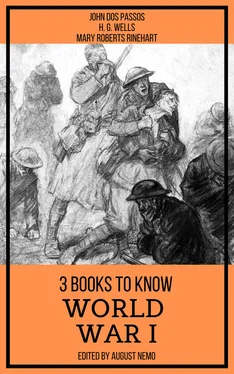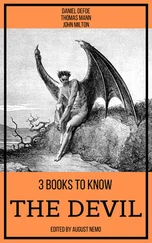Some time later Chrisfield sat down in front of Andrews. He still had his wet slicker on.
“Ah guess you think Ah'm a swine,” he said in his normal voice. “Ah guess you're about right.”
“No, I don't,” said Andrews. Something made him put his hand on Chrisfield's hand that lay on the table. It had a feeling of cool health.
“Say, why were you trembling so when you came in here? You seem all right now.”
“Oh, Ah dunno,'” said Chrisfield in a soft resonant voice.
They were silent for a long while. They could hear the woman's footsteps going and coming behind them.
“Let's go home,” said Chrisfield.
“All right.... Bonsoir, Crimpette.”
Outside the rain had stopped. A stormy wind had torn the clouds to rags. Here and there clusters of stars showed through. They splashed merrily through the puddles. But here and there reflected a patch of stars when the wind was not ruffling them.
“Christ, Ah wish Ah was like you, Andy,” said Chrisfield.
“You don't want to be like me, Chris. I'm no sort of a person at all. I'm tame. O you don't know how damn tame I am.”
“Learnin' sure do help a feller to git along in the world.”
“Yes, but what's the use of getting along if you haven't any world to get along in? Chris, I belong to a crowd that just fakes learning. I guess the best thing that can happen to us is to get killed in this butchery. We're a tame generation.... It's you that it matters to kill.”
“Ah ain't no good for anythin'.... Ah doan give a damn.... Lawsee, Ah feel sleepy.”
As they slipped in the door of their quarters, the sergeant looked at Chrisfield searchingly. Andrews spoke up at once.
“There's some rumors going on at the latrine, Sarge. The fellows from the Thirty-second say we're going to march into hell's halfacre about Thursday.”
“A lot they know about it.”
“That's the latest edition of the latrine news.”
“The hell it is! Well, d'you want to know something, Andrews.... It'll be before Thursday, or I'm a Dutchman.”
Sergeant Higgins put on a great air of mystery.
Chrisfield went to his bunk, undressed quietly and climbed into his blankets. He stretched his arms languidly a couple of times, and while Andrews was still talking to the sergeant, fell asleep.
––––––––

THE MOON LAY AMONG clouds on the horizon, like a big red pumpkin among its leaves.
Chrisfield squinted at it through the boughs of the apple trees laden with apples that gave a winey fragrance to the crisp air. He was sitting on the ground, his legs stretched limply before him, leaning against the rough trunk of an apple tree. Opposite him, leaning against another tree, was the square form, surmounted by a large long-jawed face, of Judkins. Between them lay two empty cognac bottles. All about them was the rustling orchard, with its crooked twigs that made a crackling sound rubbing together in the gusts of the autumn wind, that came heavy with a smell of damp woods and of rotting fruits and of all the ferment of the overripe fields. Chrisfield felt it stirring the moist hair on his forehead and through the buzzing haze of the cognac heard the plunk, plunk, plunk of apples dropping that followed each gust, and the twanging of night insects, and, far in the distance, the endless rumble of guns, like tomtoms beaten for a dance.
“Ye heard what the Colonel said, didn't ye?” said Judkins in a voice hoarse from too much drink.
Chrisfield belched and nodded his head vaguely. He remembered Andrews's white fury after the men had been dismissed, how he had sat down on the end of a log by the field kitchen, staring at the patch of earth he beat into mud with the toe of his boot.
“Then,” went on Judkins, trying to imitate the Colonel's solemn efficient voice, “'On the subject of prisoners'”—he hiccoughed and made a limp gesture with his hand—“'On the subject of prisoners, well, I'll leave that to you, but juss remember... juss remember what the Huns did to Belgium, an' I might add that we have barely enough emergency rations as it is, and the more prisoners you have the less you fellers'll git to eat.'”
“That's what he said, Judkie; that's what he said.”
“'An the more prisoners ye have, the less youse'll git to eat,'” chanted Judkins, making a triumphal flourish with his hand.
Chrisfield groped for the cognac bottle; it was empty; he waved it in the air a minute and then threw it into the tree opposite him. A shower of little apples fell about Judkins's head. He got unsteadily to his feet.
“I tell you, fellers,” he said, “war ain't no picnic.”
Chrisfield stood up and grabbed at an apple. His teeth crunched into it.
“Sweet,” he said.
“Sweet, nauthin',” mumbled Judkins, “war ain't no picnic.... I tell you, buddy, if you take any prisoners”—he hiccoughed—“after what the Colonel said, I'll lick the spots out of you, by God I will.... Rip up their guts that's all, like they was dummies. Rip up their guts.” His voice suddenly changed to one of childish dismay. “Gee, Chris, I'm going to be sick,” he whispered.
“Look out,” said Chrisfield, pushing him away. Judkins leaned against a tree and vomited.
The full moon had risen above the clouds and filled the apple orchard with chilly golden light that cast a fantastic shadow pattern of interlaced twigs and branches upon the bare ground littered with apples. The sound of the guns had grown nearer. There were loud eager rumbles as of bowls being rolled very hard on a bowling alley, combined with a continuous roar like sheets of iron being shaken.
“Ah bet it's hell out there,” said Chrisfield.
“I feel better,” said Judkins. “Let's go get some more cognac.”
“Ah'm hungry,” said Chrisfield. “Let's go an' get that ole woman to cook us some aigs.”
“Too damn late,” growled Judkins.
“How the hell late is it?”
“Dunno, I sold my watch.”
They were walking at random through the orchard. They came to a field full of big pumpkins that gleamed in the moonlight and cast shadows black as holes. In the distance they could see wooded hills.
Chrisfield picked up a medium-sized pumpkin and threw it as hard as he could into the air. It split into three when it landed with a thud on the ground, and the moist yellow seeds spilled out.
“Some strong man, you are,” said Judkins, tossing up a bigger one.
“Say, there's a farmhouse, maybe we could get some aigs from the hen-roost.”
“Hell of a lot of hens....”
At that moment the crowing of a rooster came across the silent fields. They ran towards the dark farm buildings.
“Look out, there may be officers quartered there.”
They walked cautiously round the square, silent group of buildings. There were no lights. The big wooden door of the court pushed open easily, without creaking. On the roof of the barn the pigeon-cot was etched dark against the disc of the moon. A warm smell of stables blew in their faces as the two men tiptoed into the manure-littered farmyard. Under one of the sheds they found a table on which a great many pears were set to ripen. Chrisfield put his teeth into one. The rich sweet juice ran down his chin. He ate the pear quickly and greedily, and then bit into another.
“Fill yer pockets with 'em,” whispered Judkins.
“They might ketch us.”
“Ketch us, hell. We'll be goin' into the offensive in a day or two.”
“Ah sure would like to git some aigs.”
Chrisfield pushed open the door of one of the barns. A smell of creamy milk and cheeses filled his nostrils.
Читать дальше













